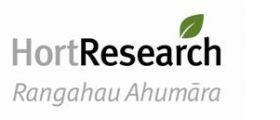
New Zealand fruit science company HortResearch and listed biotech company Genesis Research and Development Corporation Ltd today announced plans for the public release of what they described as “the world’s most extensive collection of kiwifruit DNA sequences”.
The 130,000 kiwifruit gene sequences, or expressed sequence tags (ESTs), will enable breeders to develop new cultivars of the fruit in a fraction of the time using a technique called marker assisted selection (MAS).
HortResearch say the mapped gene sequences control aspects such as colour, flavour, shape, nutrition and ripening, meaning kiwifruit development will be able to take on a new element of finesse and accuracy.
The new data is set to yield swift benefits for the New Zealand kiwifruit industry, whose single-desk exporter Zespri is in a partnership with HortResearch to develop exclusive new strains. HortResearch developed the exporter’s successful Zespri Gold variety.
The boon won’t be limited to New Zealand kiwifruit growers, however; HortResearch aims to release the data to research groups worldwide. The company said further knowledge could be gained by collaborating with scientists globally.
It took researchers eight years to index the gene sequences, but the time spent will pay off rapidly with the new breeding methods.
The marker assisted selection technique means instead of waiting for seedlings to grow to fruiting plants before being able to determine their worth, scientists can ‘scan’ the seedlings for desirable genetic markers.
The new process will save years of breeding, and HortResearch scientist Dr William Laing says that means new varieties will get to market far faster than before.
“If breeding a new fruit with a specific trait is like finding a needle in a haystack, then MAS is like having a metal detector,” he said.
“HortResearch has a collection of 23 species of kiwifruit and many more can be found in China, from where kiwifruit originated. We’re now better placed than ever to unlock some of that natural resource and deliver it to consumers.”
HortResearch released a similar catalogue of genetic information on apples in 2006, which has since been incorporated into its breeding programme.
The research will be released later this week, and a paper on the new data will be published in US journal BMC Genomics.



